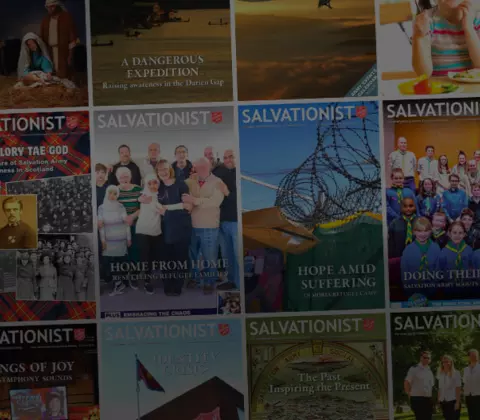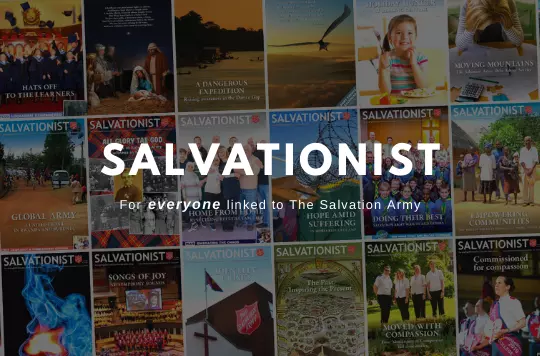
Article of the week: Racing to justice?
3 October 2020
VIEWPOINT
Captain Ben Cotterill outlines some things he’s realised about confronting conscious and unconscious bias
THE Black Lives Matter movement has come to the fore this year with allegations of police brutality hitting the headlines, most recently after the shooting of Jacob Blake in the USA. As the Covid-19 pandemic amplifies inequalities existing in the world, it is incumbent upon organisations to address the extent to which they might, albeit unwittingly, have been complicit in passive or active racism.
Individuals are also realising that an unconscious bias can inform their attitudes. Maybe it would be helpful for you to know the factors informing my outlook, before I explain some of my thoughts. I am a white, millennial, Christian, cisgender, heterosexual male – and a Salvation Army officer. Put those dynamics together and they inevitably create a certain perspective on the world, based largely on the fact that I inhabit what is commonly regarded as a dominant category. As we ponder our own innate biases, I will highlight five things I have realised.
1. Proximity can be a game-changer
If we’re not proximate with people we can’t easily begin to appreciate how life is for them and therefore our opinion has limited credibility. For example, it was an eye-opener for me to go on holiday overseas with a black friend and witness him being evicted from a shop because of his skin colour. If you have a friend or relative who is, for example, homosexual, it is difficult not to be impacted by their often painful stories of prejudice and hurt. We will appreciate another person’s reality more if we share life with, marry or even holiday with them. Apart from that, one way of educating ourselves is simply to speak with and listen to people who are outside so-called dominant categories.
2. Individual responses are not enough to change the world
If we are serious about changing society – and, indeed, our church – we have to recognise the reality that individual actions alone are not going to facilitate change. It will take collective action as well. This may mean the updating of Salvation Army positional statements or policies, coupled with the reinforcement of transparent strategic actions. Within that context, it is encouraging that this territory is undergoing a period of hearing the voices of black, Asian and minority ethnic (BAME) members so as to consider appropriate action.*
Maybe, however, in other situations where positional statements cannot yet be comfortably agreed upon by significant swathes of the Movement, we need new positions that state, honestly and humbly: ‘We don’t actually know what is right and wrong on this complicated issue, even though we thought we did. Time is needed, to prayerfully and respectfully discern a way forward.’
3. Decision-making needs to be anchored in how it affects the marginalised
In a world of hard commercial realities, every pound we earn and spend could be contributing to poverty, injustice and exploitation. We are all connected to complex international financial structures that, broadly speaking, endorse concepts of winners and losers – in monetary terms. These issues are often so entangled that we cannot easily recognise fiscal unfairness. Even the straightforward act of buying clothes – including Salvation Army uniforms – commits us to that moral minefield. Questions arise relating to the ethical production of the goods we purchase, and it behoves each of us to investigate sources and means of production.
Jesus told a story about a widow who gave the Temple treasury only a small amount, which was ‘all she had to live on’ (Mark 12:44). She was probably poor because of the socio-economic system. The spiritual point from this story is often pitched as a lesson in sacrificial giving.
However, behind that point is a burning question of outright injustice. It is possible that she was enduring poverty because her community had failed to organise a reasonable support system. Maybe we see echoes of her plight around the globe and in the United Kingdom and Republic of Ireland today.
What, though, if such issues of corruption, greed and exploitation are actually central to the challenge of the gospel, and not just added-on lessons for good living? Martin Luther King Jr once said: ‘We are caught up in an inescapable network of mutuality.’ Everything is interconnected. The gospel must therefore work on the level of inescapable mutuality. If it does not, coming generations might dispense with or sideline the Christian faith. And who could blame them?
4. Consider white supremacy
People nowadays are considering the thorny issue of ‘white supremacy’ as something other than a skin-headed, neo-Nazi caricature. If that label means or implies racial hierarchy, it is probably a good moment to reflect on how The Salvation Army was formed. Despite efforts to adapt to different cultures and nurture local leadership, arguably what happened was that it centred on the one group of people who were already in the centre – white people – and who continue to occupy international leadership positions. The reality is that the Army is a British export that initially flourished during colonial times.
How we uncouple our institutions from any prevailing accusations of white supremacy or privilege – with white people in top positions and with the whiff of gender inequality also pervading our ranks – is not straightforward. We must begin, though, with the acknowledgment that white people had – and may continue to have – what we might refer to as a ‘cheat code’ that often excludes non-white leadership in an organisation in which BAME groups make up the majority.
This uncoupling is not simple, and there have been moves to encourage BAME members into international leadership, but we need to be willing to accept correction of our waywardness, if we have been complicit in obstructing equity.
5. Stop saying the issues are too hard
The time has come for us to stop saying we’re overwhelmed and that the issues are too hard. The reality is that we are simply unpractised at centring other people. All too often, deliberately or inadvertently, we practise racism and sexism, we ignore the calls of the poor, we practise justifying harm and we have somehow become skilled at these things.
Unfortunately, it’s part of who we are as fallen people. So countering this tendency requires daily sacrifice. We have to stop nurturing a relationship that is predominantly with ourselves, and focus instead on growing a relationship with the God who is always co-creative with us whenever we endeavour to realise and enhance all that makes us wonderful in his image.
The story of Zacchaeus, the unfair tax collector in Luke 19:1–10, follows this pattern. We don’t know what Jesus said to him, but it might well have been, ‘You are ignorant and the way you deal with money is the greatest challenge to justice.’ Zacchaeus recognised that challenge and moved into the mind- mode of refunding monies owed – including reparation costs times four.
Are we willing to consider these options with heart and mind? Possibly, within this context, that’s the only way fullness of salvation will come to our house, as it did to a first-century tax collector and crook. Zacchaeus worked out what it meant for him personally; we must do likewise. As we do so, Jesus will bless our intentions, our decisions and our actions.
- This article was originally posted at mindfulsalvationist.wordpress.com
CAPTAIN COTTERILL IS SUPPORT OFFICER, INTERNATIONAL PROJECTES OFFICE, THQ
* The Territorial Advisory Council (TAC) is researching the ethnicity of our congregations and local and officer leadership, making contact with as many people from as many ethnic groupings as possible – primarily to listen to their stories and understand, then to make recommendations to the territory’s senior leadership. Email tac@salvationarmy.org.uk to be put in touch with your divisional TAC member so the process of listening might

From the editor
An early look at the editor's comment

Salvationist
Salvationist is a weekly magazine for members and friends of The Salvation Army

The War Cry
The War Cry is packed with features, reviews, mouth-watering recipes, puzzles and more.